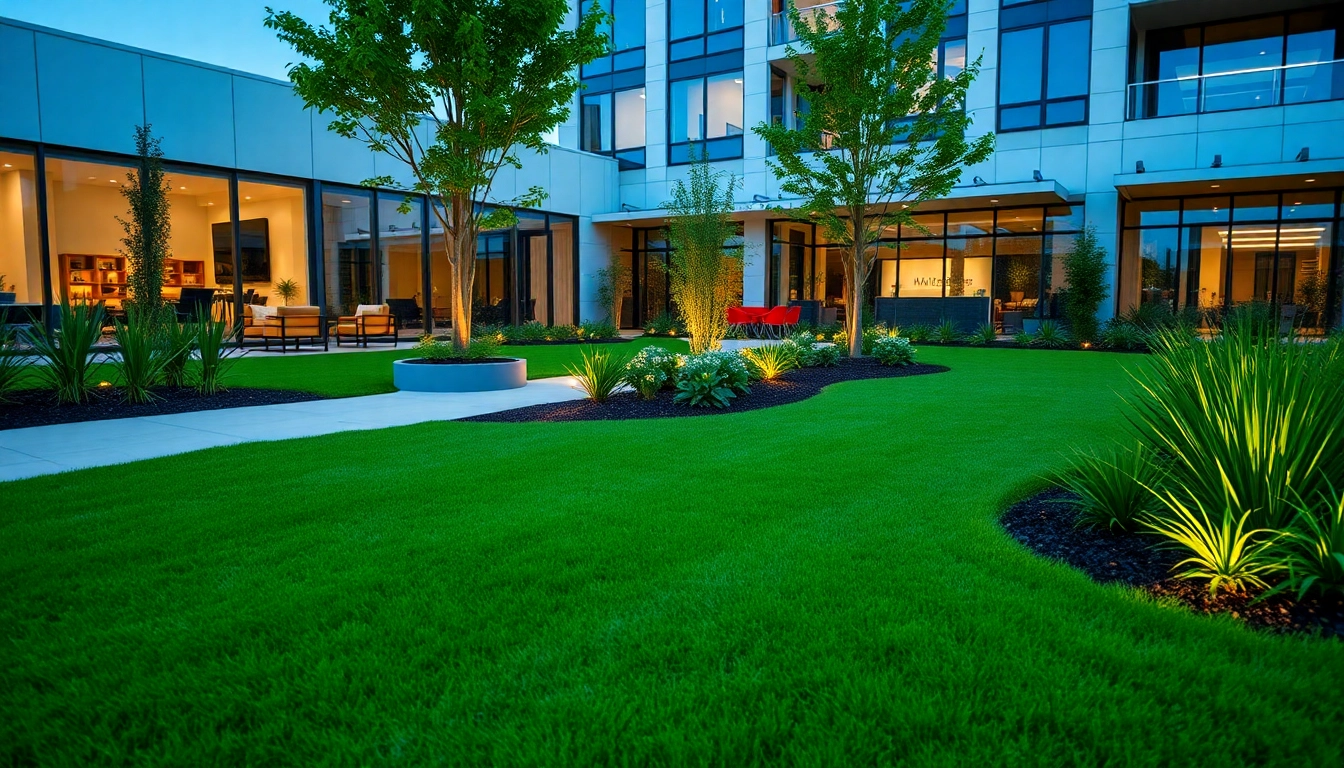Main Benefits of Hiring Commercial Landscaping Contractors
Increased Property Value
Hiring commercial landscaping contractors can significantly boost the value of your property. A well-designed landscape not only enhances aesthetics but also appeals to potential buyers or tenants. According to studies, properties with professionally maintained landscapes can increase in value by up to 15%. This is because first impressions are lasting, and a beautiful outdoor space can create a strong emotional connection with visitors.
Moreover, a professional landscape can highlight key features of a property, such as walkways, patios, and water features, making them stand out and be more inviting. Additionally, an effective landscape can increase the usability of outdoor spaces, which is particularly valuable in commercial properties where outdoor seating or recreation can enhance the customer’s experience.
Environmental Impact
Commercial landscaping contractors play a critical role in enhancing the environmental sustainability of a property. By implementing eco-friendly practices such as native planting, water-efficient irrigation systems, and organic maintenance approaches, landscapes can become healthier and more resilient. Native plants, for instance, require less water and maintenance, helping to reduce the environmental footprint of a property.
Furthermore, well-designed landscapes improve air quality and reduce urban heat, contributing to a healthier environment. Trees and green spaces absorb carbon dioxide and produce oxygen, which is crucial in urban settings where air pollution can be a concern. By employing sustainable landscaping techniques, commercial contractors can positively impact the local ecosystem, making communities more livable.
Time and Cost Efficiency
Time is money in the commercial sector, and hiring a landscaping contractor can lead to significant savings. These professionals can manage landscaping tasks much more quickly than an in-house team or business owner, due to their experience and access to specialized equipment. Consequently, businesses can dedicate their time and resources to their core operations while leaving the landscaping to the experts.
In the long run, investing in professional landscaping can also be cost-effective. With regular maintenance and expert care, landscapes are less likely to encounter expensive issues down the road. Contractors can identify potential problems early, preventing costly repairs, and ensuring that the property is always looking its best without constant financial strain.
Key Services Offered by Commercial Landscaping Contractors
Landscape Design and Planning
One of the primary services offered by commercial landscaping contractors is landscape design and planning. Skilled professionals begin with a thorough assessment of the property and its surroundings, considering factors like climate, soil type, and existing vegetation. This information is critical for creating a tailored design that complements the environment and meets the client’s needs.
Landscape design encompasses various elements, from selecting plants and materials to laying out pathways, patios, and decorative features. By employing creative and functional design strategies, contractors can enhance the overall use of outdoor spaces, ensuring they are both functional and visually appealing.
Maintenance Services
Ongoing maintenance is essential for any landscaped area, and commercial landscaping contractors provide services to ensure that the landscape remains healthy and attractive year-round. This can include lawn care, pruning, fertilization, pest control, and seasonal clean-ups, which are all crucial for sustaining a vibrant outdoor space.
Regular maintenance not only promotes plant health but also enhances the efficiency of the landscape design. For example, well-maintained greenery will remain attractive while also providing shade or screening, which can reduce heating and cooling costs for buildings. A maintenance schedule tailored to the seasons can help achieve optimal results, preserving the landscape’s beauty throughout the year.
Installation of Hardscapes
In addition to softscaping, commercial landscaping contractors are experts in the installation of hardscapes, which include features such as patios, walkways, retaining walls, and outdoor seating areas. Hardscaping serves multiple purposes, including functionality, visual interest, and erosion control.
These structures can transform an outdoor space, providing areas for relaxation, entertainment, or navigation. A well-designed hardscape can also sustain the landscape by helping with drainage and reducing the impact of erosion, particularly in elevated areas or sloped properties.
Selecting the Right Commercial Landscaping Contractors
Assessing Experience and Expertise
Choosing the right commercial landscaping contractor is crucial for the success of your project. Start by assessing the contractor’s experience and expertise. Look for companies that have been in business for several years, as they are likely to have a proven track record of delivering successful projects.
Consider their specialties; some contractors may have more experience in particular areas like sustainable landscaping, while others may excel in more traditional designs. Additionally, certifications and training in horticulture or landscape architecture can provide insights into their credibility and skill level.
Reviewing Past Projects
Before hiring a commercial landscaping contractor, it’s essential to review their past projects. Look for case studies, client testimonials, and portfolios that showcase their work. This will give you an idea of their design style, adaptability, and the quality of work they deliver.
Don’t hesitate to ask for references from previous clients to learn about their experiences. Questions such as timeliness, communication, and overall satisfaction can provide valuable insights into what you can expect if you choose to work with them.
Obtaining Quotes and Proposals
Once you have shortlisted potential contractors, obtain quotes and proposals from each. This will help you understand their pricing structure as well as the services provided. Be clear about your project goals and budget during these discussions to ensure you receive tailored quotes.
Compare the proposals carefully, not just for cost but also for the scope of services included. A lower price may not always equate to better value; consider what is included in the service, and prioritize quality and expertise over cost in your decision-making process.
Trends in Commercial Landscaping
Sustainable Landscaping Practices
In recent years, there has been a significant shift towards sustainable landscaping practices in the commercial sector. Businesses are increasingly aware of their environmental responsibilities and are seeking strategies to reduce their ecological footprint.
Contractors are now utilizing sustainable materials, water-efficient irrigation systems, and native plants that require less maintenance and irrigation. Implementing rain gardens, permeable pavements, and xeriscaping are also popular trends, allowing for efficient water management and reduced runoff.
Enhancing Curb Appeal
With the competitive landscape in commercial real estate, enhancing curb appeal has become more critical than ever. Businesses understand that an attractive exterior can draw in customers and create a positive first impression. Landscaping trends emphasize low-maintenance designs that provide visual impact without significant upkeep costs.
Features such as vibrant flower displays, seasonal color changes, and strategic lighting not only enhance aesthetics but also promote a welcoming atmosphere. Efficient use of space is paramount in maximizing the impact of landscaping on curb appeal.
Innovative Use of Technology
The integration of technology into landscaping is another growing trend. Commercial contractors are employing various technologies to enhance design, maintenance, and customer engagement. Tools like landscape design software, drone technology for surveying properties, and automated irrigation systems are becoming standard practice.
In addition, augmented reality (AR) is now being used to help clients visualize their landscapes before implementation. This innovative approach not only streamlines the design process but also allows for greater client satisfaction as they can see potential outcomes in a virtual space.
Measuring Success in Landscaping Projects
Establishing KPIs
To gauge the effectiveness of landscaping projects, it’s essential to establish key performance indicators (KPIs). These measurable values can help you assess whether your landscaping initiatives are aligning with your business goals. Common KPIs might include property value increase, customer satisfaction ratings, and the frequency of maintenance interventions.
By tracking these KPIs over time, businesses can determine whether their investment in landscaping is providing the desired returns. This data-driven approach allows for informed decision-making and adjustments to landscaping strategies as necessary.
Client Feedback and Satisfaction
Client feedback is another crucial metric to evaluate the success of landscaping projects. Regularly surveying customers and clients can provide insights into their perceptions of the landscape and its impact on their experience. Understanding their needs and how the landscape meets those needs can help in making continuous improvements.
It’s beneficial to implement feedback mechanisms such as online surveys or informal discussions to gauge satisfaction levels, which can ultimately inform future landscaping decisions and enhance overall client engagement.
Long-term Maintenance Plans
Establishing long-term maintenance plans can significantly influence the success of landscaping initiatives. These plans should detail ongoing care requirements, seasonal tasks, and budget considerations. By setting clear expectations for maintenance services, businesses can ensure their landscapes remain healthy and attractive over time.
Regular audits and updates to the maintenance plan can help address any emerging issues and adapt to changing needs as the landscape matures. A proactive approach ensures long-term value from landscaping investments and maximizes the aesthetic appeal of the property.



